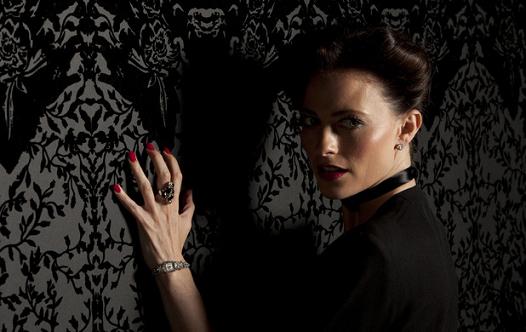Thoughts on 'Sherlock' Series 2
I’m about to go all “detective” on you for a moment. If my site metrics are to be believed, an early article of mine about BBC’s Sherlock has been pulling in a lot of views recently. Unfortunately, I get the sense that people landing on the post aren’t finding what they’re looking for. I can’t account for why Google is pushing Sherlock fans towards an article of mine on Series 1, so I thought I’d offer something more current.
Series 2 just finished airing in the U.K. last month, so here’s a post collecting my thoughts on the three episodes – not so much a review with a ranking, but a general reaction. As any of you who have seen the second series will know, there’s a lot to admire.
Episode One, called “A Scandal in Belgravia”, has been anticipated by fans of the show for months. And it delivered on expectations. The episode introduced us to Irene Adler (Lara Pulver), the pseudo-love-interest of Sherlock Holmes from the Arthur Conan Doyle stories. As an added bonus, the episode’s writer, Steven Moffat, even managed to weave in a delightfully complex mystery.
It was as if the creators were dancing around us, feeding the audience exactly what we wanted: brilliant banter between Sherlock and the rest, fantastic production values, and an impressive story.
Sherlock and John are summoned to Buckingham Palace, in the midst of rising popularity and professional success, to solve a potentially embarrassing situation for the royal family. Adler, reimagined here as a dominatrix, claims to have scandalous photos of a young royal, meaning it is Sherlock and John’s task to find the photos and discover what other dirty little secrets Adler may know.
Character bits aside (I don’t want to spoil the excellent banter for you), this show constantly floors me with its editing. Scene transitions and floating text fly about at lightning speed, reflecting the pace of Sherlock’s mind.
For the observant viewer, it’s like we’re being bodily pulled into each case, noticing little details in step with Sherlock. We still revel in the characters putting all the pieces together at the end, but this way of constructing the visuals is more immersive than most shows I’ve encountered.
I was really taken with Lara Pulver’s work as Irene Adler. Pulver brought out the perfect combination of seduction and vulnerability that allowed us to hate her and pity her and cheer for her all at once. The way she faces off with Sherlock could rival the intellectual battles waged between him and Moriarty, and that’s saying something. I really hope she appears again in Series 3.
On to Episode Two, “The Hounds of Baskerville”. Here, the Baskerville family from the story is re-imagined as a secret military base on the moors of Devon, the source of rumours about mutated animal experiments and chemical weapons.
A young man named Henry (Russell Tovey) enlists Sherlock and John to help him find out if his father really was murdered by a monstrous hound he thinks he saw out on the moors. Meanwhile, Sherlock and John’s friendship is tested when Sherlock gives in to the fear that he might have seen the hound himself.
I loved the way this was handled, because it turned out that Sherlock wasn’t afraid of the beastie itself, but feared what seeing the creature might mean for his detective skills. That little detail paired perfectly with how Cumberbatch plays Holmes: his intellect is all that matters, one of his only treasured possessions, and to have it corrupted is a fate worse than death (in the teeth of hell-hound, no less).
And then there’s Episode Three, “The Reichenbach Fall”, the one every Sherlock fan has been furiously typing about online since the episode aired on January 15. Like the third episode of the first series, Jim Moriarty (Andrew Scott) turns up as the indomitable criminal for the ultimate detective. He aims to fully discredit Sherlock’s professional success and finish it all off with the sleuth’s death.
If this Moriarty doesn’t go down as one of the best screen villains in recent memory, I’ll be shocked. He’s so gleefully malevolent, it’s just unfair - a personification of chaos. And yet, it’s fantastic to see him onscreen. In particular, there’s a stunt he pulls with a fake identity partway through the episode that had me squirming in frustration. As for what he does in the climactic scene – I did not see that coming.
On the whole, over the three episodes, Benedict Cumberbatch and Martin Freeman are in top form as Sherlock and John. I’m even getting to like Mycroft Holmes more thanks to the depth provided by Mark Gatiss’ performance (who also happens to be the show’s co-creator).
Whoof – there’s a lot of material here, and I’ve barely scratched the surface. I don’t want it to sound like I’m just here gushing about the series, but it reflects what many Sherlock fans already know – this show is an excellent bit of television. Track it down online or elsewhere as soon as possible.
What did you think of Sherlock Series Two? Impressed? Disappointed? What do you think about the American version of the show that just cast Jonny Lee Miller as a modern Sherlock in New York City? Sound off in the comments section down below. You can also follow me on Twitter or catch up on past posts by browsing through these links:
-
First Thoughts on Alcatraz | Why We Need a Second Season of Terra Nova
Why You Need to Check Out Fringe | Why I’m Not Worried That Community Is On Hiatus
-




